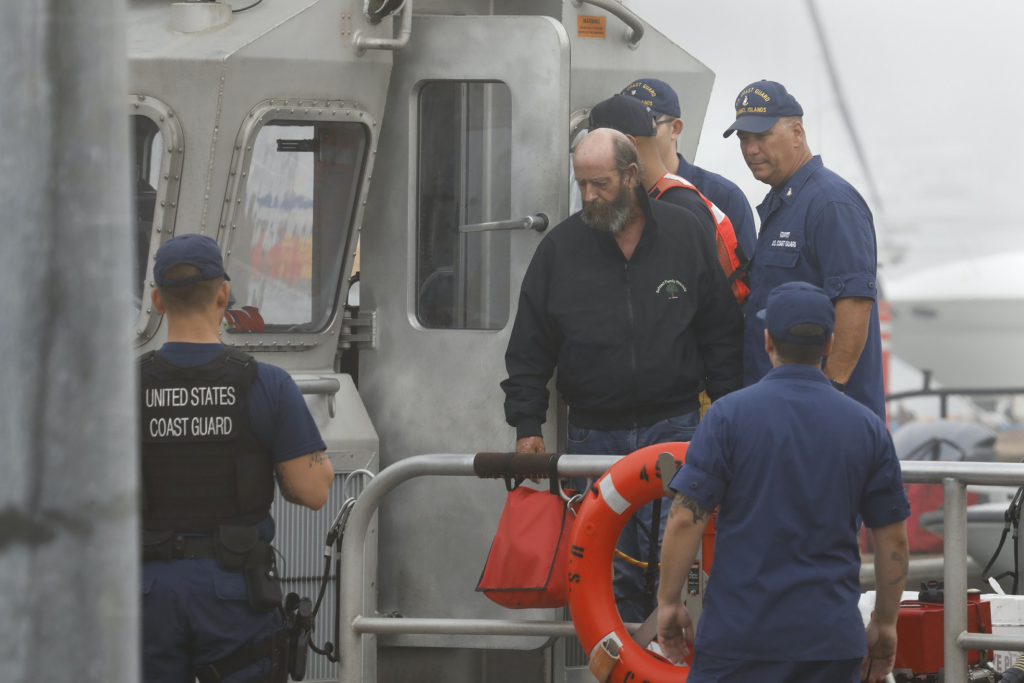Prosecutors alleged the captain failed to set a roving patrol, failed to conduct fire drills and failed to sufficiently train his crew.
The captain of the Conception, the dive boat that caught fire last year off the coast of Santa Barbara, was indicted Tuesday by a federal grand jury on 34 counts of seaman’s manslaughter for the passengers and crew member who died in one of the worst maritime disasters in recent U.S. history.
The indictment says that as the leader of the Labor Day weekend diving tour near the Channel Islands, Jerry Boylan, 67, “was responsible for the safety and security of the vessel, its crew, and its passengers,” according to the U.S. attorney’s office in Los Angeles, which announced the charges.
Boylan, a resident of Santa Barbara, was expected to surrender to authorities at a later date, and two federal public defenders representing him did not respond to messages seeking comment. If convicted, Boylan faces a maximum sentence of 10 years in prison for each count of seaman’s manslaughter, although defendants have typically served less time in custody.
“As a result of the alleged failures of Captain Boylan to follow well-established safety rules, a pleasant holiday dive trip turned into a hellish nightmare as passengers and one crew member found themselves trapped in a fiery bunkroom with no means of escape,” United States Attorney Nick Hanna said in a statement.
Family members of those who perished in the vessel’s bunk room during the Sept. 2, 2019 fire told The Times they were informed Tuesday afternoon of the criminal charges.
“I am glad they finally indicted the captain,” James Adamic said in a phone interview. His sister, Diana Adamic; brother-in-law, Steven Salika; and niece, Tia Salika-Adamic, were on board the Conception for a family diving vacation when the fire consumed the boat and killed them.
“It has to be done to hold someone accountable,” Adamic said. “But I hope it is a first step, as the owner needs to also be held accountable.”
The ship’s owner, Glen Fritzler and his company, Truth Aquatics, have been the subject of a multi-agency investigation that began shortly after the Conception burned and sank to the ocean floor.
Earlier this year, the National Transportation Safety Board faulted Truth Aquatics for failing to adhere to various safety practices, with the chairman of the NTSB, Robert Sumwalt, urging the company, “Clean up your act.” Fritzler and his Santa Barbara-based diving outfit have also faced a barrage of lawsuits from the relatives of dead passengers, but no criminal charges.
Fritzler could not be reached for comment. His attorneys, Stephen Larson, a former federal judge, and Hilary Potashner, the former top public defender for the Central District of California, issued a statement expressing sympathy to victims and families. “We and our clients are and will be forever saddened by this tragedy,” the lawyers said.
As captain of the ship, Boylan had long been a target of a criminal inquiry. In July, the captain and his attorney met with prosecutors and were presented with evidence authorities had gathered about his failure to safely operate the Conception.
The pressure to file charges against Boylan rose after a hearing this fall held by the NTSB revealed that many of those trapped below deck were awake — some with their shoes on — as the fire engulfed the vessel , but could not escape the bunk room and died of smoke inhalation. That victims were awake contradicted what Santa Barbara County officials had long maintained: that the 34 who died likely never knew of the encroaching flames.

The indictment said that “by his misconduct, negligence, and inattention to his duties,” Boylan caused the deaths of all 34 people. Prosecutors singled out three violations: failing to have a roving patrol; failing to conduct sufficient fire drills; and failing to conduct sufficient crew training.
The summary of alleged failures mirrors the NTSB’s findings, which also said that not having a roving watchperson, among other lapses, prevented crew members from detecting the fire sooner, saving lives.
“Our hope is that this indictment leads to the prevention of boating accidents and the senseless destruction of lives through proper precautions and training,” said Kristi K. Johnson, the assistant director in charge of the FBI’s office in L.A.
The same federal charge used to prosecute Boylan has become more common in cases of negligence and misconduct at sea. In 2013, BP pleaded guilty to 11 count of seaman’s manslaughter in connection with the explosion and fire on the Deepwater Horizon oil rig in the Gulf of Mexico. Federal prosecutors in Missouri charged a duck boat captain and two others under the statute after 17 people died from a capsized boat in 2018.
Boylan is a veteran in the Central Coast’s maritime scene, with a long history at Truth Aquatics and experience navigating the Channel Islands, former crew members said.
It was Boylan who told the U.S. Coast Guard in a statement that by the time crew awakened him, the fire had already reached the upper deck and smoke filled the wheelhouse — the top level of the 75-foot boat, above the cooking area. He managed to issue a distress call shortly after 3 a.m., gasping into the radio, “I can’t breathe.”
Boylan had to jump into the water to escape, he said. Almost instantly, he recognized the magnitude of the disaster. The second galley hand told federal officials that when Boylan came to the surface of the water, he said, “‘Oh my God, all those people,'” according to NTSB records.
The NTSB determined the fire began in the back of a middle deck salon where lithium-ion batteries were being charged, but the agency could not say whether it was the batteries, the ship’s electrical system or an unattended fire source that ignited the blaze.
Sumwalt, the NTSB chairman, said regardless of the source of the fire, those below deck probably could have escaped if there had been early detection of the blaze by a roving watch. Instead, most of the crew was asleep on the top level of the boat. Without anyone awake, the agency found, the crew was notified of the fire by the pop, crackle and the glow of the flames.
The family of Charles McIlvain, who died aboard the Conception, renewed their call late Tuesday for Congress to pass the Small Passenger Vessel Safety Act. The bill includes stricter standards for fire alarm systems and requires no less than two escape routes from all areas used by passengers.
“We not only want to see those responsible held fully accountable but also ensure this type of disaster never happens again,” said McIlvain’s wife, Jasmine Lord-McIlvain, and parents.




